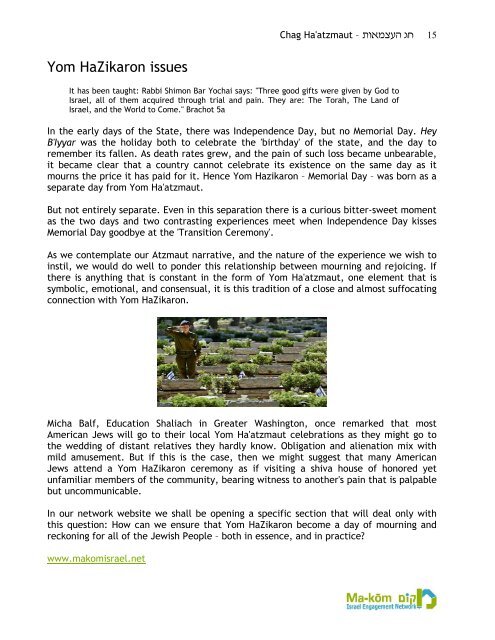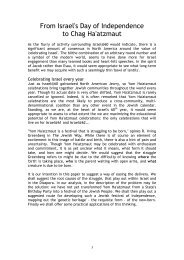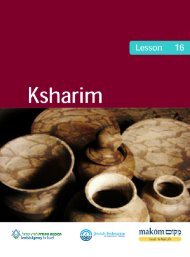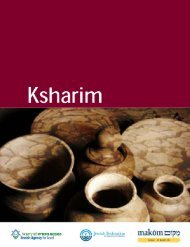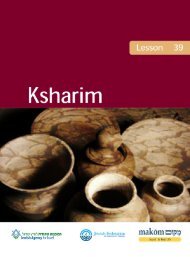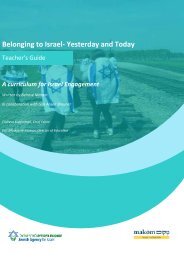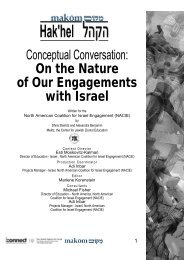Lihiyot Am Chofshi b'Artzenu To be a Free People in ... - Makom Israel
Lihiyot Am Chofshi b'Artzenu To be a Free People in ... - Makom Israel
Lihiyot Am Chofshi b'Artzenu To be a Free People in ... - Makom Israel
You also want an ePaper? Increase the reach of your titles
YUMPU automatically turns print PDFs into web optimized ePapers that Google loves.
15 חג העצמאות – Ha'atzmaut Chag<br />
Yom HaZikaron issues<br />
It has <strong>be</strong>en taught: Rabbi Shimon Bar Yochai says: "Three good gifts were given by God to<br />
<strong>Israel</strong>, all of them acquired through trial and pa<strong>in</strong>. They are: The <strong>To</strong>rah, The Land of<br />
<strong>Israel</strong>, and the World to Come." Brachot 5a<br />
In the early days of the State, there was Independence Day, but no Memorial Day. Hey<br />
B'Iyyar was the holiday both to celebrate the 'birthday' of the state, and the day to<br />
remem<strong>be</strong>r its fallen. As death rates grew, and the pa<strong>in</strong> of such loss <strong>be</strong>came un<strong>be</strong>arable,<br />
it <strong>be</strong>came clear that a country cannot celebrate its existence on the same day as it<br />
mourns the price it has paid for it. Hence Yom Hazikaron – Memorial Day – was born as a<br />
separate day from Yom Ha'atzmaut.<br />
But not entirely separate. Even <strong>in</strong> this separation there is a curious bitter-sweet moment<br />
as the two days and two contrast<strong>in</strong>g experiences meet when Independence Day kisses<br />
Memorial Day goodbye at the 'Transition Ceremony'.<br />
As we contemplate our Atzmaut narrative, and the nature of the experience we wish to<br />
<strong>in</strong>stil, we would do well to ponder this relationship <strong>be</strong>tween mourn<strong>in</strong>g and rejoic<strong>in</strong>g. If<br />
there is anyth<strong>in</strong>g that is constant <strong>in</strong> the form of Yom Ha'atzmaut, one element that is<br />
symbolic, emotional, and consensual, it is this tradition of a close and almost suffocat<strong>in</strong>g<br />
connection with Yom HaZikaron.<br />
Micha Balf, Education Shaliach <strong>in</strong> Greater Wash<strong>in</strong>gton, once remarked that most<br />
<strong>Am</strong>erican Jews will go to their local Yom Ha'atzmaut celebrations as they might go to<br />
the wedd<strong>in</strong>g of distant relatives they hardly know. Obligation and alienation mix with<br />
mild amusement. But if this is the case, then we might suggest that many <strong>Am</strong>erican<br />
Jews attend a Yom HaZikaron ceremony as if visit<strong>in</strong>g a shiva house of honored yet<br />
unfamiliar mem<strong>be</strong>rs of the community, <strong>be</strong>ar<strong>in</strong>g witness to another's pa<strong>in</strong> that is palpable<br />
but uncommunicable.<br />
In our network website we shall <strong>be</strong> open<strong>in</strong>g a specific section that will deal only with<br />
this question: How can we ensure that Yom HaZikaron <strong>be</strong>come a day of mourn<strong>in</strong>g and<br />
reckon<strong>in</strong>g for all of the Jewish <strong>People</strong> – both <strong>in</strong> essence, and <strong>in</strong> practice<br />
www.makomisrael.net


